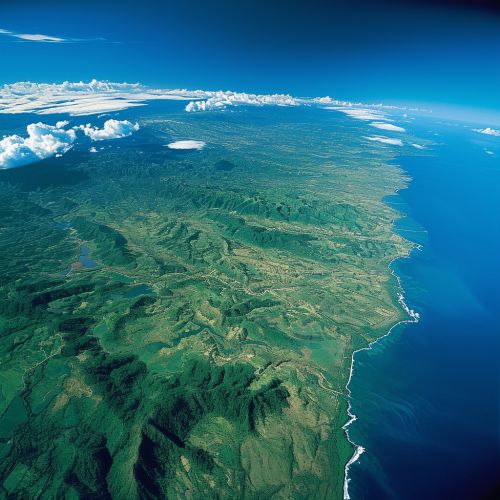Caribbean Region (Colombia)
Geography
The Caribbean Region of Colombia is located in the north of the country, extending from the coastline of the Caribbean Sea to the Andean highlands. This region is characterized by its diverse topography, which includes coastal plains, river valleys, and mountain ranges. The Caribbean Region is divided into eight departments: Atlántico, Bolívar, Cesar, Córdoba, La Guajira, Magdalena, San Andrés and Providencia, and Sucre. Each of these departments has its unique geographical features and ecosystems, contributing to the region's rich biodiversity.


Climate
The Caribbean Region experiences a tropical climate, characterized by high temperatures and significant rainfall throughout the year. The average temperature in the region is around 27°C (80.6°F), with minor variations between the coastal areas and the inland regions. The region's climate is influenced by the Caribbean Sea's warm currents and the northeastern trade winds, resulting in a humid and hot environment. The rainfall pattern varies, with the wettest months being May to November, while the driest period is from December to April.
Flora and Fauna
The Caribbean Region is home to a diverse range of flora and fauna, thanks to its varied ecosystems that include coastal areas, wetlands, forests, and mountains. The region's biodiversity is among the highest in Colombia, with numerous endemic species. The flora of the region includes mangroves, tropical rainforests, and savannahs, each hosting a unique set of plant and animal species. The fauna is equally diverse, with a variety of birds, mammals, reptiles, and amphibians inhabiting the region.
Economy
The economy of the Caribbean Region is diverse and robust, with significant contributions from agriculture, mining, tourism, and manufacturing sectors. The region's fertile soils and favorable climate conditions make it ideal for agriculture, with major crops including bananas, coffee, cocoa, and various fruits and vegetables. The Caribbean Region is also rich in mineral resources, including coal, natural gas, and salt. The tourism sector is another significant contributor to the region's economy, attracting visitors with its beautiful beaches, historical sites, and vibrant culture.
Culture
The Caribbean Region of Colombia is known for its rich cultural heritage, which is a blend of indigenous, African, and Spanish influences. This cultural diversity is reflected in the region's music, dance, cuisine, and festivals. The region is famous for its traditional music genres such as Cumbia and Vallenato, which have gained international recognition. The Caribbean Region's cuisine is diverse and flavorful, featuring seafood, tropical fruits, and local spices. The region also hosts several cultural festivals throughout the year, celebrating its unique heritage and traditions.
Demographics
The Caribbean Region has a diverse population, with a mix of ethnic groups including Mestizos, Afro-Colombians, indigenous peoples, and others. Spanish is the predominant language in the region, although several indigenous languages are also spoken. The region's major cities include Barranquilla, Cartagena, and Santa Marta, each with its unique demographic characteristics.
Infrastructure
The Caribbean Region has a well-developed infrastructure, including transportation, utilities, and telecommunications. The region is served by several major highways, airports, and seaports, facilitating domestic and international travel. The region's utilities infrastructure includes electricity, water supply, and sanitation facilities. The telecommunications infrastructure is modern and extensive, with widespread access to telephone, internet, and broadcasting services.
Education
Education in the Caribbean Region is administered by the Colombian Ministry of Education, with a network of public and private schools, colleges, and universities. The region's education system follows the national curriculum, which includes primary, secondary, and tertiary education. The Caribbean Region is home to several prestigious universities, including the University of Cartagena and the University of the North, offering a wide range of academic programs.
Health
The health sector in the Caribbean Region is managed by the Colombian Ministry of Health and Social Protection. The region has a network of public and private healthcare facilities, providing a range of medical services. The health system in the region follows the national health policy, which aims to ensure universal access to quality healthcare services.
